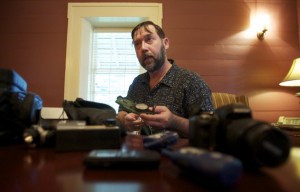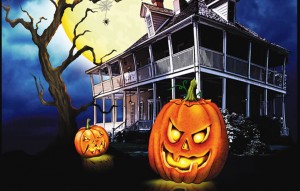Historian investigates stories of Grant House ghost

This story ran in The Columbian on October 26, 2012:
On an appropriately gray and foggy Saturday, Jeff Davis laid out his plan of attack in what was once the sitting room of Gen. Alfred Sully, commander of Vancouver Barracks from 1874 to 1879.

Ghost hunter and historian Jeff Davis checks his equipment before looking for evidence of spirits at the Grant House on Officers Row. Buy this photo (Photo by Steven Lane)
Reaching into his bags, Davis pulled out a compass, two small blue walkie-talkies, a meter to detect electromagnetic fields, a digital recorder and batteries — lots of batteries — and placed them on the finely polished wood table.
His plan: Use the equipment to find evidence of Sully’s ghost.
There have been a variety of odd reports and sightings over the years at Sully’s former residence, the Grant House, which is now an upscale restaurant.
But Davis, a local author and historian, likes to take an approach to ghost hunting that’s as scientific as possible, relying more on instruments and photographs and less on anecdotes.
He believes in ghosts, he said, but he understands why many people find the evidence shaky at best.
“Everybody’s a skeptic until it happens to them,” Davis said. “I certainly don’t have all the answers.”
Suzy Taylor, who owns the restaurant with her sister and husband, said she’s heard stories from staff about Sully’s ghost pacing the hallways. She even has a tale or two herself.
“One day I was upstairs and I saw someone in black coming across the hall here,” Taylor said. “I went downstairs to ask who it was and they said nobody had gone up. I was excited. I was like, ‘I just saw a ghost!’ I had been skeptical before that.”
Another time a package of English muffins fell off a bread rack that was across the room from where the kitchen staff were standing. Taylor walked over to put it back on the rack and made sure it was stable. When she walked back across the room, the package of muffins fell off once again, she said.
“We were like, ‘OK, time to leave,'” Taylor said.
The Grant House was built in 1849 and is the oldest building on Officers Row. Despite the name, though, Ulysses S. Grant didn’t live there. He lived in the Quartermaster’s Ranch.
Back in the 1800s, the building was a headquarters, officers club and residence for the first commander or other high-ranking visiting officials from the Army. Since then, it’s been used as a home, offices, a museum and a private club.
Davis has collected stories for more than a decade from restaurant managers, staff members and others who have spent time there.
Some have reported cold spots and pacing footsteps in the hallway near Sully’s former quarters in the eastern end of the building’s second floor. Others have seem a tall man with a beard, wearing a long, old-fashioned coat standing on the balcony.
Is it the ghost of Sully?
Perhaps, Davis said.
“You have to keep yourself from getting too excited,” he said. “If you watch too many of those TV ghost-hunter shows you almost expect there will be music and a buildup and then something will happen. But the activity is generally much more subtle.”
After checking his equipment, and tweaking a walkie-talkie that had some odd battery problems, Davis set up a fully charged video camera to record the goings on during the investigation.
The camera, which should have about two hours of recording time, went dead after 20 minutes.
“Am I claiming it’s the ghost? Not necessarily,” he said, testing his backup battery.
That was dead, too.
Some people might be spooked by batteries mysteriously going dead. Davis isn’t particularly. He sees it as a possible good sign.
“Batteries wear out anyway, but they do seem to go dead more frequently in places like this,” he said. “If you believe that ghosts exist through the laws of physics, then you could say it takes them a while to charge up. Some people think ghosts use that energy (from the batteries) to get enough power to manifest.”
Before moving on to look for electronic voice phenomenon, or EVP, Davis scattered a set of Scrabble tiles in the next room, which was also part of Sully’s living quarters back in the 1800s.
“We will put these in a random pattern and leave them, then come back later and see if they’ve been rearranged,” Davis said.
He had the tiles move once over the 20 years or so that he’s been looking for ghosts. When he was checking passages in the Seattle Underground, he came back to find his randomly placed tiles had been moved to spell “CAT.”
“They did move one other time, but I know it was somebody playing around,” Davis said. “I know because they moved the tiles to spell ‘IDIOT.'”
Back in the sitting room, Davis checked the walls and fixtures for electromagnetic activity with his Gauss EMF meter. The meters generally trip near light fixtures, in-wall wiring, plugs and switches.
They also sometimes trip when strange activity happens.
After he finished that step, he started listening for EVPs, or ghost voices that can you can’t hear until you play back a recording, he said.
With the digital recorder, he asked a simple question, then waited four seconds for a response before asking the next. After each series of four or five questions, he stopped, played the recording back and listened for strange sounds.With no luck after five or six attempts, he decided to move to the room with the Scrabble tiles. He also started talking about Sully’s life in hopes of drawing out the ghost.
“For this guy, the medical evidence is unclear, but he was very sick,” Davis said. “I think he may have had stomach cancer. Others think it was kidney problems. Sometimes he couldn’t get out of bed and other times he’d pace the hall at night because of the pain.”
Old newspaper reports portray him as a fairly somber and stoic fellow.
In 1877, the Vancouver Independent described him at a drill: “The General looks venerable with his silver locks, and gives the command with a stern dignity born of a long experience in Army life.”
Sully fought in the Civil War, but at Vancouver Barracks his job would have been more focused on paperwork, meetings and reports.
Striking out once again on his EVP attempts, Davis tried describing what the building might have smelled like back in Sully’s day.
“It was kind of sweaty, smoky, and water was always a problem here,” Davis said. “The well they had was not as sweet as the surgeon general would have liked. They also used beeswax candles, which is a sort of cloyingly sweet smell.”
After once again finding nothing, and also noticing that there was no movement on the Scrabble tiles, Davis decided to give up for the day.
But the four hours weren’t without their mystery. As he packed up to leave, the camera that had gone dead suddenly came back on, fully charged.
Davis hadn’t plugged it in or tried to charge it in any way.
“Ghost hunting, it’s kind of like a trial where you gather evidence,” Davis said with a shrug. “I’ve never seen an apparition, and yet strange things like that often happen.”

